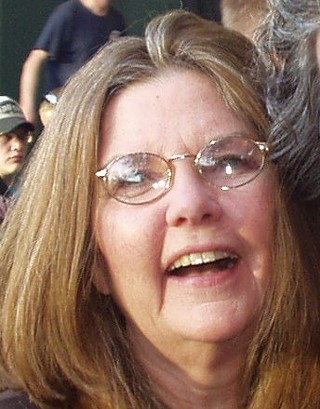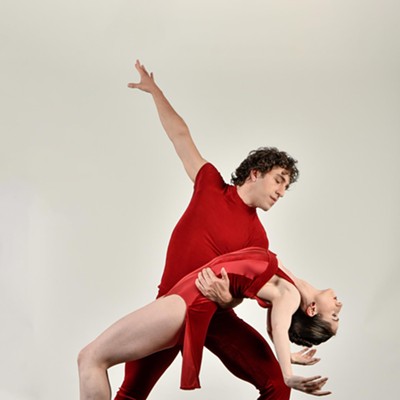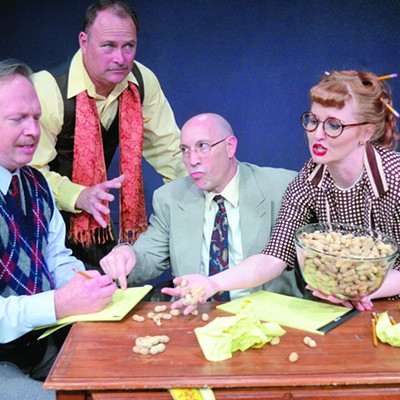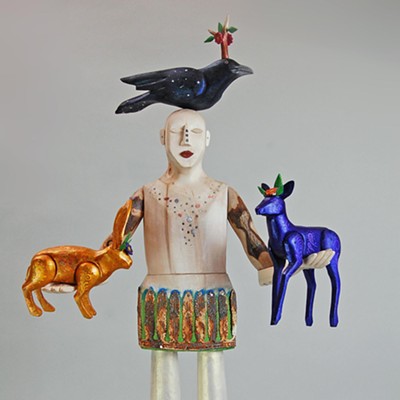The Allstars blend ancient, exotically tight West African vocal harmonies with reggae-like beats and polyrhythms, an occasional overlay of rap and lyrics that wring hope, wit and impossible optimism from appalling circumstances.
The group was introduced to the world in 2004 via the award-winning documentary The Refugee Allstars, by Zach Niles and Banker White. You don't have to see the film to enjoy the accompanying double-disc release Living Like a Refugee, or to be moved to dance at their performances. But to witness the unfathomable horrors that begot the band is to visit their music with sheer awe for their courage. Fortunately, screenings at the Loft will enable you to take in the full experience; showtimes are Friday, July 21, at 6 p.m., and Saturday and Sunday, July 22 and 23, at 2 p.m.
The Refugee Allstars began with Reuben M. Koroma and Francis John "Franco" Langba, musician friends separated when they fled the carnage of the 1999 rebel siege of Freetown, Sierra Leone. Film footage of the chaos--and stories of random, brutal murders, amputations and arson--make it seem miraculous that anyone got out alive, but the two were eventually reunited in a refugee camp in Guinea. Inspired to offer a moment's respite to the thousands of other traumatized refugees, they began performing in the camp. They were soon joined by other musician refugees, two of them amputation victims. The core band comprised six members, including Koroma's wife, Efuah Grace, vocals; Abdul Rahim "Arahim" Kamara, vocals and percussion; Alhaji Jeffrey "Black Nature" Kamara, rap; and Mohamed "Medo" Bangura, vocals, percussion and kongroma. Langba plays guitar.
All but "Medo" have since repatriated to Sierra Leone, an outcome that was by no means a foregone conclusion. In fact, only the opportunity to make Living Like a Refugee in a Freetown studio overcame their fear of renewed bloodshed in their homeland, despite the assurances of their government, and the U.N. High Commissioner for Refugees, that the war had ended in 2002. "Medo" held out for reasons perfectly understandable to those who see the film; his story will stop your heart. But Koroma says he's determined to pick him up in Guinea and take him home on the way back from this, the band's third U.S. tour. Meanwhile, "Medo" gets his share of all the band's revenues.
Such sharing is a reflection of the strength with which the band members and their families have clung together, not only for emotional support, but for such practical matters as sharing food and looking after each other's health.
Koroma is the leader and father of them all. "We always considered the band as a family," he says. "Living together, sharing together would be the best policy to help us overcome problems."
As the lead singer and songwriter, he directs arrangements and sets the tone for the band, but it's his warm-hearted charisma and infectious optimism that hold them all together. That and his overload of talent.
As a Freetown school kid in the 1970s, Koroma was drawn to the popular music of the West that he heard on local radio stations. Reggae in particular caught his fancy--especially the music of Bob Marley and Gregory Isaacs--because it sounded like the traditional music his father played. The similarity isn't coincidental; the Allstars' multicultural music stew arises naturally from Sierra Leone's history as a center of the 18th century slave trade.
Spaniards brought the first slaves to North America from Sierra Leone. Through the 18th century, the trade thrived all across Africa, with Europeans and Brazilians handling the distribution to the Western Hemisphere. Because Britain was opposed to slavery, many blacks in the United States were loyal to Britain in the Revolutionary War. When that war ended, 400 such loyalists were evacuated to London, and 2,000 were "rewarded" with mostly barren land in Nova Scotia. Life was so harsh there that many died. In fact, prior to that time, Britain had used exile in Nova Scotia as punishment for the Maroons, runaway slaves who rebelled against British rule in Jamaica. In order to relocate all its troublesome freed slaves once and for all, Britain established Freetown in 1787.
The Allstars' music integrates their country's historically diverse cultural traditions into what U.S. audiences most likely will register as an "Afro-Caribbean" sound. Black Nature's periodic overlay of raps, in the Sierra Leonean creole called Krio, French and English, make that sound as contemporary as an urban street corner.
Koroma's lyrics also update reggae's traditional politics by globalizing it. His favorite song, he says, is the album's title track, which captures the plight of refugees the world over with lines like, "You will be confronted by strange dialects / You will be fed unusual diets." "Weapon Conflict" is a parable of collateral damage: "When two elephants are fighting / the grass they will suffer." "Akera Ka Abonshor" ("message to the family") could be addressed to the family of humanity: "Because we were born in the same land / we should have one voice and be united / Let us progress so we can look to the future / Let us drop our fighting because we know what war can do."
Koroma's impressions of the United States are generous. "I just keep on admiring the nice work, the good people," he says, "but I know it's not magic, it's hard, hard work. Americans are hard-working."
Having begun the band's career touring Guinean refugee camps to provide healing music and dancing, he has some additional hopes for the band's current tour, beyond generating record sales and tour income to sustain "the family." His message to the world: "Let us try to solve our problems without fighting. Man is the most intelligent animal. We shouldn't behave like beasts. We should be able to use our brains to solve problems."
And for Tucsonans, he has this tip: "If they come, they will get what they want: good music!"












